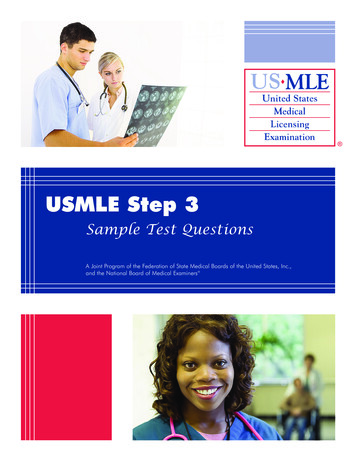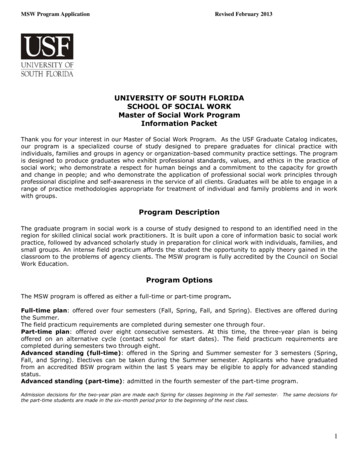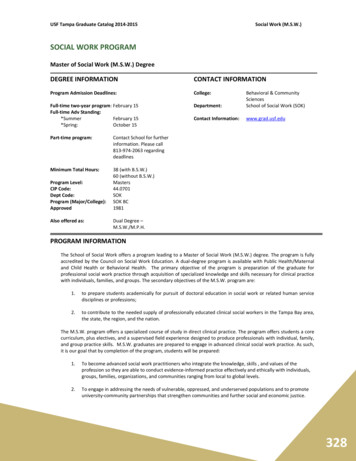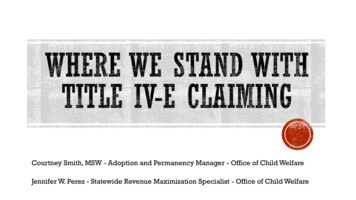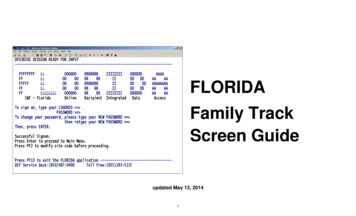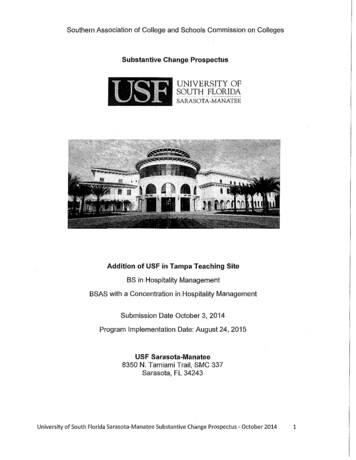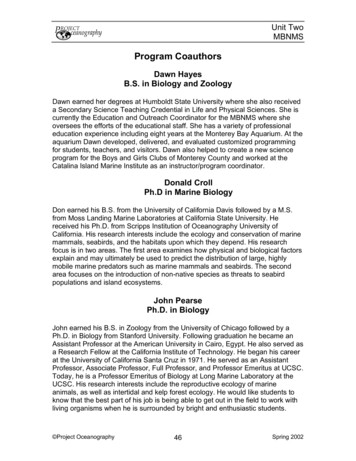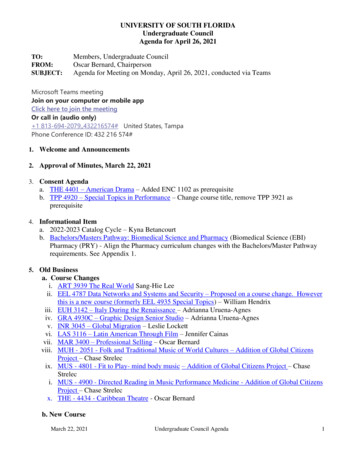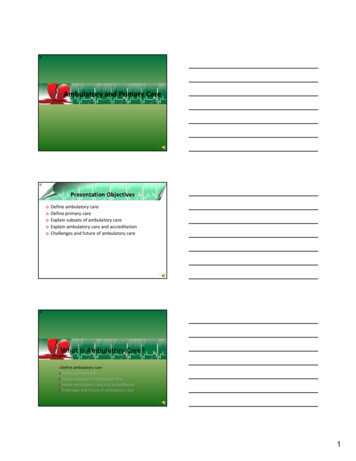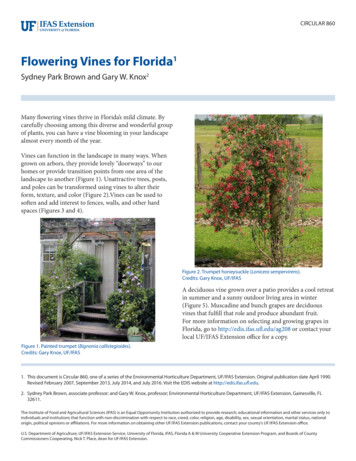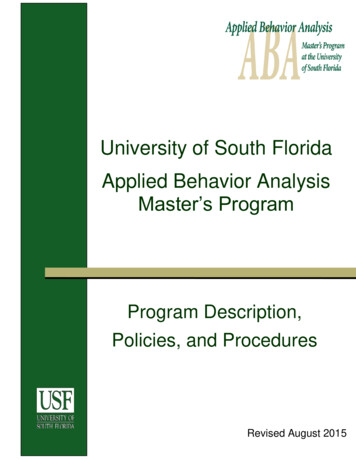
Transcription
University of South FloridaApplied Behavior AnalysisMaster’s ProgramProgram Description,Policies, and ProceduresRevised August 2015
ABA Program Policies and Procedures2The USF Master’s Degree Program inApplied Behavior AnalysisThe primary goal of the Applied Behavior Analysis (ABA) Master’s Program is forstudents to acquire knowledge and demonstrate competencies in applied behavioranalysis. Students of the program function as practitioners and researchers,applying these skills as they address behavioral issues of social importance inrelevant settings. Student preparation for these professional roles will beaccomplished through the program’s core courses, elective courses, practicumexperiences, mentoring by major professors and other program-related faculty, andthe thesis.The masters program in ABA was designed for graduates to obtain the course workand experience necessary for certification by the Behavior Analyst CertificationBoard (described below).Behavior Analyst Certification Board The Behavior Analyst Certification Board (BACB) has developed a process forissuing an international credential for the profession of behavior analysis. The BACBhas established uniform content, standards, and criteria for the credentialing processthat are designed to meet legal requirements for the practice of behavior analysis,standards for certification, and the best practice and ethical standards of the field.The BACB requires that students receive 270 classroom hours of graduate levelinstruction in the following content areas:Content areasA. Ethical and Professional ConductB. Concepts and Principles of Behavior AnalysisC. Research Methods in Behavior AnalysisHours45 hours45 hours45 hours Measurement (including Data Analysis) – 25 hrs Experimental Design – 20 hrsD. Applied Behavior Analysis105 hours Fundamental Elements of Behavior Change & Specific BehaviorChange Procedures – 45 hrs Identification of the Problem & Assessment – 30 hrs Intervention & Behavior Change Considerations – 10 hrs Behavior Change Systems – 10 hrs Implementation, Management and Supervision – 10 hrsE. Discretionary30 hoursIn addition, students must complete 1000 hours of supervised practicum in behavioranalysis within a university practicum program that is approved by the BACB andoffered for academic credit. Practicum students must be supervised by a BoardCertified Behavior Analyst approved by the USF ABA Master’s Program PracticumCoordinator at least every week for 10% of the total hours they spend in practicum.
ABA Program Policies and Procedures3The practicum experiences should focus on learning new behavior analytic skillsrelated to the BACB 4th Edition Task List within the following activities:a) conducting assessment activities related to behavioral interventions;b) designing, implementing, and monitoring behavior programs for clients;c) overseeing the implementation of behavior programs by others; andd) other activities normally performed by a behavior analyst.The course sequence and practicum of the ABA Master’s Program at USF has beenapproved by the Behavior Analyst Certification Board. Students who graduate fromthe ABA Master’s Program at USF are eligible to take the BCBA (Board CertifiedBehavior Analyst) certification examination.CurriculumThe program’s curriculum consists of coursework and supervised practicumexperiences designed to build competencies in three interrelated areas: (1) theconceptual principles and foundations of applied behavior analysis, with anemphasis on operant learning theory; (2) the methods and procedures of appliedbehavior analysis, including techniques of measurement, assessment, interventionstrategies, and single subject time series designs; and (3) issues of application inreal world settings, including ethics and contextual variables related to organizationalsystems, culture, and families.The ABA Master’s Program is part of the Department of Child and Family Studieswithin the College of Behavioral and Community Sciences. The 44-credit-hourMaster’s Program in Applied Behavior Analysis has been sequenced to emphasizecourse work in the first year and thesis research in the second year. Students willparticipate in practicum activities and Practicum Seminar in both years of theprogram. In addition to required coursework, practicum, and thesis research,graduate students also are encouraged to get involved in research projectsconducted by faculty members and fellow graduate students. By assisting in theresearch of others, students learn valuable research skills they will need when theyconduct their own thesis research. In addition, assisting other graduate studentsconducting their master’s theses facilitates the completion of their theses and theirtimely graduation.
ABA Program Policies and Procedures4Table 1. Program of StudyCourseFirst Year – Fall SemesterEDF 6215 Applied Behavior Analysis Basic PrinciplesEDG 6931 Observational Methods and FunctionalAssessmentPSY 6217 Single Case Experimental DesignMHS 6940 Practicum SeminarFirst Year - Spring SemesterEDF 6217 Behavior TheoryMHS 6100 Applied Behavior Analysis in ComplexCommunity EnvironmentsEDG 6931 Ethics in Applied Behavior AnalysisMHS 6940 Practicum SeminarSummerMHS 6940 Practicum SeminarMHS 6971 ThesisChoose major advisor and thesis topicComplete literature review for the thesisComplete and defend thesis proposalComplete and submit IRB materialsElectiveSecond Year - Fall SemesterMHS 6940 Practicum SeminarMHS 6971 ThesisBehavior Analysis and Dev. DisabilitiesElectiveSecond Year - Spring SemesterMHS 6940 Practicum SeminarMHS 6971 ThesisElectiveHours3332333222324324The masters program requires 30 hours of non-elective course work, 6 hours ofelectives, and 10 hours dedicated to thesis research. The required and electivecourses are listed below.Required CoursesEDF 6215 APPLIED BEHAVIOR ANALYSIS BASIC PRINCIPLES (4 credits)EDG 6931 OBSERVATIONAL METHODS/FUNCTIONAL ASSESSMENT (3 credits)
ABA Program Policies and Procedures5PSY 6217 SINGLE CASE EXPERIMENTAL DESIGN (3 credits)EDF 6217 BEHAVIOR THEORY (4 credits)MHS 6100 ABA IN COMPLEX COMMUNTY ENVIRONMENTS (3 credits)EDG 6931 ETHICS IN APPLIED BEHAVIOR ANALYSIS (3 credit)MHS 6940 PRACTICUM SEMINAR (2 credits) - Students enroll in PracticumSeminar across 5 semesters for a total of 10 creditsMHS 6971 THESIS (2 credits in the summer and 4 credits in the fall and 4 credits inthe spring of the second year). The master’s thesis is described below.Elective CoursesMHS 6900: Behavior Analysis and Developmental Disabilities (3 credits)MHS 6608: School-Wide PBS (3 credits)MHS 6605: Addressing Behavior Challenges in Young Children (3 credits)MHS 6900: Behavioral Collaboration & Consultation (3 credits)Practicum and Practicum SeminarThe USF Applied Behavior Analysis Program follows the experience guidelines ofthe Behavior Analysis Certification Board (www.BACB.com), which require 1,000total hours of practicum experience learning the skills related to the BACB 4th EditionTask List. Students must work 10-30 hours per week at their practicum site forthose hours to be approved. The practicum requires the completion of activitiesunder the direct supervision of a Board Certified Behavior Analyst (BCBA) who hasbeen approved by the ABA Program’s Practicum Coordinator as a field supervisor.Supervision must take place on a weekly basis and may include a combination ofmeetings with the supervisor and direct observation of applied activities by thesupervisor. Students must receive weekly supervision amounting to 10% of the timethey spend in practicum activities. This is a floating average (must end up with 100supervision hours by the end) but students should make every attempt to correlate 1supervision hour in the same week as every 10 hours of work. Thus, the rule is 1to-10 within the same timeframe with an occasional exception being acceptable.Supervision may be conducted in small groups of 10 or fewer participants for nomore than half of the total supervised hours in each supervisory period, the
ABA Program Policies and Procedures6remainder of supervision hours should consist of direct one-to-one contact. Thesupervisor is required to sign an official form from the BACB (BACB Fieldwork andPracticum Experience Supervision Form) verifying completion of appropriateactivities. The practicum student is encouraged to complete an Activities Logdescribing each day’s practicum activities and having the supervisor both initial theline items and sign off on the activity report. The on-site supervisor directs the dailyactivities of the student in the practicum setting.Practicum PlacementA student’s practicum placement will be determined by assessing the student’sinterests and matching those interests to available sites during the first semester ofprogram enrollment. The decision about where to place a student will be determinedin consultation with the student, the Practicum Coordinator, and the on-sitesupervisor. The Practicum Coordinator, who will be the contact person between theprogram and the practicum site, will manage the placement process. The studentwill interview at one or more sites recommended by the Practicum Coordinator andaccept a position with a site and supervisor. After conferring with the site andsupervisor, the Practicum Coordinator will confirm the placement. Once thesepreliminary placement activities have occurred, and the placement is confirmed, thePracticum Coordinator will send a letter of understanding to the site supervisor.Students should actively work towards placement and expect to be placed by theend of their first semester, although most students are placed by October.Students will be required to maintain their practicum placement a minimum of twosemesters and should conduct themselves according to the professionalexpectations listed below. At least two qualitatively different sites must beexperienced before graduation. You may continue on with any practicum placementlonger than two semesters if it is desired by both you and the supervisor.Changing/adding practicum sites will provide students with the experiencesnecessary to implement the repertoire of behavioral techniques required for futurework in a variety of settings. However, if a particular site offers opportunities forworking with multiple clients in multiple settings with various approaches tointervention, a student may petition the ABA Program Practicum Coordinator tocontinue at a particular site for his or her entire practicum experience.Role of the Practicum CoordinatorThe Practicum Coordinator will identify and approve appropriate placement sites,develop placement agreements with on-site supervisors, provide on-site supervisorswith information on practicum expectations and documentation, place students, andprovide ongoing support to on-site supervisors. The Practicum Coordinator willconvene a practicum seminar for students enrolled in the Practicum Seminar courseand assign a final grade for the practicum course. The Practicum Coordinator is theinstructor of the practicum experience and will be responsible for ensuring that the
ABA Program Policies and Procedures7practicum experience is a proper fit for the students’ needs and that students areobtaining the appropriate experiences needed to master the required competencies.Practicum SeminarStudents will participate in a weekly practicum seminar conducted by the PracticumCoordinator. The seminar will involve skills training activities, case review anddiscussion, and a project involving student presentations of assessment andintervention with clinical cases from their practicum site.To be awarded a passing grade for the Practicum Seminar in a particular semester astudent must a) attend and participate in the seminar meetings, b) complete therequired assignments, c) receive a satisfactory rating (4 out of 5 overall) by youronsite supervisor for performance during the semester, d) accumulate a minimum of40 hours of supervised practicum activities each month during the semester, and, e)complete the requirements of the placement. If a student is fired or let go from aplacement for unsatisfactory professional and/or ethical behavior the student will failthe seminar for that semester regardless of other scores or evaluations from otherplacements.EvaluationThe Practicum Coordinator is responsible for assigning a letter grade at the end ofeach semester in which a student is involved in practicum work. The determinationthe student’s grade is based on participation in Practicum Seminar as described inthe syllabus, the on-site supervisor’s evaluation of student performance; the numberof hours of work completed that semester, a copy of products created while in thepracticum site, and the final semester project.On-site supervisors will complete an overall evaluation of student performance at theend of each semester and the evaluation will be placed in the student’s program file.Additionally, students will have the opportunity to provide formal feedback on theirexperience at each practicum site each semester.Ethical ConsiderationsStudents will be directed to secure permission prior to the implementation of anyprocedure with children and adults. While at the practicum site, students will adhereto the Behavior Analyst Certification Board Guidelines for Responsible Conduct forBehavior Analysts .Professional BehaviorAll graduate students will be expected to engage in professional behavior as theyengage in activities related to the masters program. Professional behavior includes(but is not limited to) the following:
ABA Program Policies and Procedures 8Class attendance and participation. Students are expected to attend allclasses and to let instructors know in advance of any unavoidable absences.As classes occur on a schedule, students should not plan trips or vacationsthat conflict with the semester schedule. Students are responsible for anyclass assignments, schedule changes, etc. that occur in class if they mustmiss class.Participating in class. Students are expected to participate in classes bypaying attention to the person speaking, asking questions, and contributing inother expected ways (e.g., using dry erase boards for active responding).Unacceptable behavior in class includes using your phone for any reason,using your computer for any reason except note taking, and engaging in rudeor disrespectful behavior. If you must take a call or receive a text due to anemergency (e.g., you have a client in crisis, you are waiting for a call from asick family member) you must leave the class to receive the call or text ormake a call or text. Otherwise, students must not have a phone out of theirpocket, purse, or handbag in class. Phones must be set on silent or vibrate inclass. Students using computers or tablets in class to take notes cannot beconnected to the internet (no email, Facebook, or web browsing) and cannotwork on other class or work assignments.Respectful interactions with others. Students are expected to interact withother students, faculty, clients, supervisors, and others in a respectfulmanner. This means respecting diversity among individuals and respectingdifferences in professional approach. Not all individuals with whom youinteract will be like you and not all professionals will be behavior analysts.Your acceptance of others and of others’ perspectives will make you betterable to work with them. What is implied here is that students must engage inpositive and constructive interactions with others. Furthermore, students mustrefrain from engaging in negative, critical, and demeaning talk about others(gossip).Assertiveness. If a student has a concern with the actions of another student,coworker, or faculty member, the student should address the concern withthat person as soon as possible. Often, problems with others arise because ofmisunderstandings. The only way problems or concerns can be resolved is bytalking with the individual(s) involved.Punctuality. Students are expected to show up on time for classes, meetings,practicum, and any other scheduled activities. Showing up on time meansleaving on time (and anticipating traffic). It is also important to call the personwith whom you have a commitment or meeting if you will be late for someunexpected reason.Responsibility. Students are expected to complete assignments on time andin an accurate fashion, whether related to class, research, or practicum. It isthe student’s responsibility to clarify the nature of assignments if they aren’tclear and to seek out assistance when necessary. In addition, studentsshould attempt to be proactive with regards to communication and requesthelp or information in a timely fashion.
ABA Program Policies and Procedures 9Proper attire. As professionals in practicum settings you should dress in attireappropriate to the setting. Others’ impressions of you, and of applied behavioranalysis more generally, will be determined not just by how well you do yourwork but by how you present yourself as well.Student Advisement and Major Professor AssignmentDuring the first two semesters of coursework, the student will select a majorprofessor who will serve as the student’s advisor and thesis committee chair. Thestudent must identify a major professor by end of the second semester in theprogram.Thesis RequirementThe culmination of a student’s experience and training will be the execution of theresearch thesis. The thesis requirement will involve the execution of a researchproject and the writing of a thesis that is accepted by the student’s committee andthe Graduate School. The purpose of the thesis is to enhance student abilities to:1) Conceptualize research questions that are socially significant andimportant to the further development of applied behavior analysis; and2) Apply sound research strategies in answering one of these questions.The thesis will consist of a) conceptualizing an original research project, writing athesis proposal and orally defending the proposed research in a thesis proposalmeeting and b) implementing of the proposed research, writing the thesismanuscript, and orally defending the completed thesis in the final defense meeting.The study must involve the collection of empirical data that are analyzedquantitatively in order to answer an important question relevant to the practice ofapplied behavior analysis. It is expected that the study will involve the manipulationof environmental variables in order to determine their functional relation to behaviorof social importance. In studies that do not involve the manipulation ofenvironmental variables or single subject experimental designs, the student mustdemonstrate in writing, as part of the thesis proposal, the clear relevance andimportance of the study to the discipline of applied behavior analysis. If needed, thestudent’s major professor may require the student to enroll in an additional researchcourse to ensure the student has the adequate preparation to successfully executethe thesis requirement.All three members of the student’s thesis committee must approve a thesis proposalin advance of data collection. A thesis proposal includes an introduction section(that includes the research question with appropriate reference to the supportingliterature), a method section, and a brief results section describing expected resultswith a graph of hypothetical data. Prior to starting data collection the student mustalso complete all IRB documentation and training requirements and obtain IRB
ABA Program Policies and Procedures10approval. The thesis will consist of the conceptualization and defense of a writtenproposal, implementation of the research, and final thesis manuscript. The finalthesis document must be presented to the student’s committee in an oral defenseaccording to the guidelines of the Graduate School. The thesis document andprocess must meet all Graduate School timelines and format(http://www.grad.usf.edu/policies.php).The student’s
The masters program in ABA was designed for graduates to obtain the course work and experience necessary for certification by the Behavior Analyst Certification . The USF Applied Behavior Analysis Program follows the experience guidelines of the Behavior Analysis Certification Board (www.BACB.com), which require 1,000

